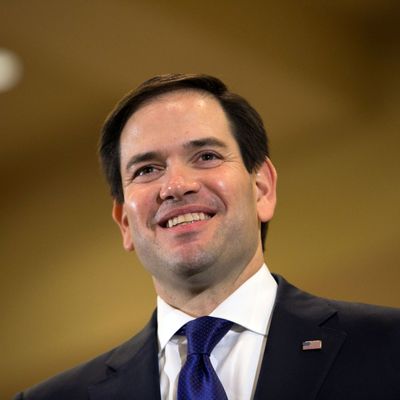
In April of last year, Marco Rubio wrote that the Trans-Pacific Partnership would “further our strategic goals in Asia and increase prosperity at home,” in an op-ed for The Wall Street Journal. Seventeen months and one humiliating presidential campaign later, Rubio still supports the “concept” of the trade deal, but isn’t sure he supports the agreement in its current form.
“I’d love to have a free trade agreement with the Asia-Pacific region. But it has to be the right deal,” Rubio, who is in a tight race to retain his Senate seat, told Politico this week. “Just like I support home ownership, but it has to be under the right terms.”
Rubio isn’t the only (historically) pro-trade Republican to suddenly turn his back on the Club for Growth: In 2015, Pat Toomey heralded the TPP as a boon to “economic growth” and “job creation” in Pennsylvania. Now Toomey is calling on Obama to shelve the deal.
Officially, Toomey discovered his antipathy for the agreement when reading its fine print. While many progressives have complained about the TPP’s protections for drug patents — which would export America’s high pharmaceutical prices to the developing world — Toomey believes those protections aren’t extensive enough. He also (officially) thinks the agreement doesn’t provide American dairy farmers with sufficient access to the Canadian market.
Here’s a more plausible explanation for Toomey’s change of heart:
One month before Donald Trump launched his campaign for the presidency, Pew Research asked Republican voters whether free-trade agreements had been a good or bad thing for the United States. Fifty-one percent said that such deals had been good for America, while 39 percent said the opposite. When Pew took the temperature of those voters again last month, those numbers had flipped. In 2016, a full 61 percent of Republicans say free trade has hurt America. GOP voters have never taken that dim view of trade, since Pew first began soliciting their views on the subject in 2009.
Which makes sense: The party’s mercantilist nominee has spent most of the past 14 months linking the TPP — and every other trade agreement from the past two decades — with stupid Democrats who couldn’t negotiate their way into an extra ketchup packet at a McDonald’s drive-through.
Even Ohio’s Republican senator Rob Portman — a former U.S. trade representative — felt the shifting winds, declaring his opposition to the TPP way back in February.
It’s far from clear that the GOP’s newfound trade skepticism will last long past November. The fact that rank-and-file opinions on the subject could change so dramatically, over such a short time horizon, suggests Republican voters’ opposition to free trade is only skin-deep. If Trump loses, the party’s next standard-bearer may be able to rebrand the concept with the right symbology. And if Trump wins, any trade agreement he negotiates will be seen as a great deal, by definition.
Regardless, though, Trump may have succeeded in poisoning the waters for the TPP. While the American public as a whole still has a warm association with the phrase “free trade,” Politico reports that few insiders believe Capitol Hill will take action on the agreement during the lame-duck session, as the TPP’s boosters had once hoped.
If you aren’t enthusiastic about expanding the reach of an unaccountable global super-court — that allows corporations to fine countries for passing public interest regulations — then you might consider this one of the few redeeming features of Trump’s terrifying political ascent.






























